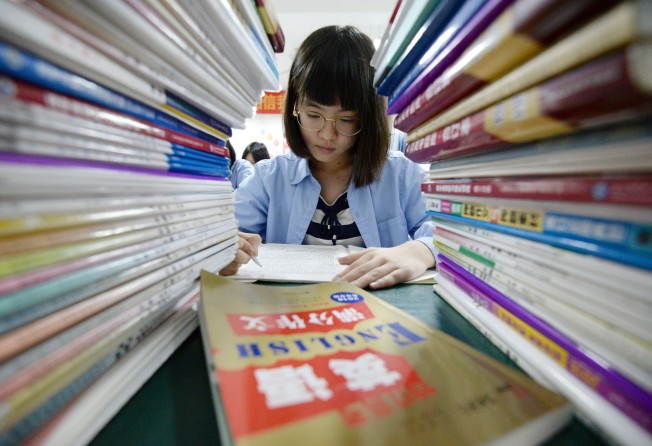Head of Chinese school operator Yuhua demands reversal of ban on M&A deals that has crippled stock prices and ‘threatens growth’
- Li Guangyu, chairman of Hong Kong-listed Yuhua Education, calls for the removal of a clause in a new draft law that restricts schools’ expansion through M&A deals
- In a rare move, he addressed his concerns directly at lawmakers at Beijing’s annual National People’s Congress

The chairman of one of China’s largest private school operators has slammed a controversial new law that is likely to crimp the expansion of schools, and has already battered their stock prices, during his speech to legislators at the country’s main political event of the year.
Li Guangyu, chairman and founder of Yuhua Education – which runs 29 schools from kindergartens to colleges across China – called for the removal of a clause in a draft law that would ban private schools from expanding by acquiring not-for-profit schools.
The release of the draft legislation in August, along with a ban on kindergartens raising funds in capital markets announced a few months later, has pushed Chinese education stocks off a cliff, as investors panicked over the prospect of stunted growth under the tightened regulation.
Beijing has not explained the reasoning behind the clause but it may stem from concerns that fast-expanding schools are putting profit before teaching, according to a report by Guosen Securities released in August. Companies could also take on too much debt to acquire schools and compromise the teaching quality, which would lead to social unrest.
It provides a clear demonstration of how a sudden policy change by Beijing can upend an industry overnight, as has previously happened in sectors like online gaming and pharmaceuticals.
“Article 12 would restrict the development of listed companies, which are China’s most regulated and highest-quality private education operators,” Li said, referring to the restrictive clause, in an interview with the South China Morning Post on Thursday.
“I clearly advised the Ministry of Justice to remove Article 12 from the law in my speech at my delegation’s meeting this morning.” Li is a delegate to the National People’s Congress, China’s largely rubber-stamp legislature.
The share price of Yuhua Education, the fourth-largest school operator listed in Hong Kong by market capitalisation, tumbled by over a third in a single day on August 31, after the proposed rule was made public, and was still only a half of its July peak on Thursday.
More than a dozen of its peers suffered similar losses, including Maple Leaf Education and China Education Group, which plunged by 31 per cent and 21 per cent on the same day, respectively.
Acquisition of existing schools has been a major way for school operators to scale up rapidly. The introduction of Article 12 – part of a broader law covering all aspects of private schools’ business, from registering to operation standards and finance – would effectively bar the companies from fast expansion and dim their investment outlook.
Li was the first industry executive to throw the controversial clause under the spotlight at the annual meeting of China’s top political elite, known as the Two Sessions, which began on Tuesday.
His remarks are also a rare public rebuke of a specific clause, even though Li said he supports the broader law and believes Beijing firmly supports and encourages private education.
Currently all schools in China are nominally not-for-profit, though authorities are pushing for a classification system. When the classification is implemented, all schools offering China’s compulsory education – which covers primary and middle school – must be not-for-profit. Therefore, the clause puts an especially heavy shackle on primary and middle school operators.
Yuhua Education, which operates all types of school from kindergartens to colleges, will focus more on tertiary education in the future, according to Li.
“We did start out by doing middle and high school education, but now over two-thirds of our student population, revenue and profit come from the higher education segment,” he said.
“We will continue to perfect our kindergarten, primary and middle school segments, but our priority in development and acquisition is higher education.”
Li said he also used his Two Sessions speech to advocate for lower tax rates for profit-making private schools, which are set to lose their tax benefits according to the draft law once the classifications system is implemented.
Li advised that the tax rate should not exceed that imposed on high-tech industries, which is around 15 per cent. Currently Yuhua schools are exempted from sales and income taxes as not-for-profit entities.
Having been virtually free of oversight in the past, the private education industry has enjoyed fast development in recent years, driven by higher income levels and an undersupply of quality education in China.
The sector is set to reach 4.9 trillion yuan (US$730 billion) by 2020 from 2.9 trillion yuan in 2016, according to consultancy Frost & Sullivan.
Riding on the growth, at least 15 private education firms have gone public in Hong Kong and the US over the past two years, while education-related start-ups have raised 28 billion yuan worth of capital from private equity and venture capital funds.
Now, regulatory risks have cast a long shadow over the industry. But Li is still optimistic.
“The market reaction makes sense, but sometimes the market overreacts too. The draft legislation is not final, and it’s still in a process of modification and improvement,” he said.
Li said it is likely to take another two years for various departments and local governments to introduce specific rules to implement the law, and that gives the market time to digest and understand the policies.
“By that time the market will finally take a breath and know the policy is supportive,” he said.